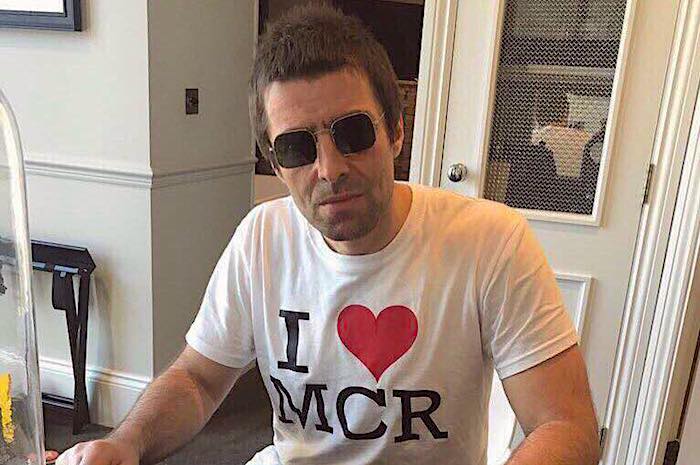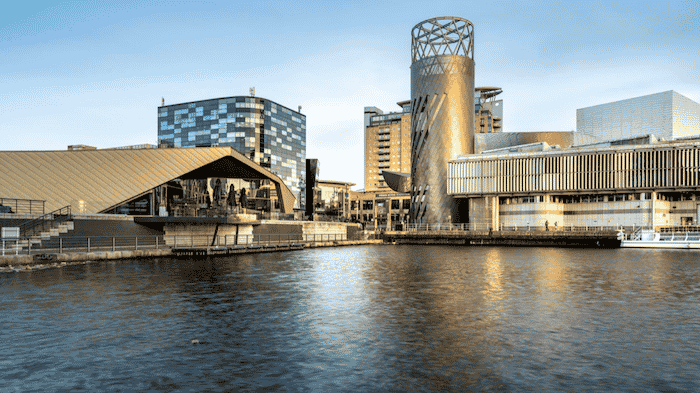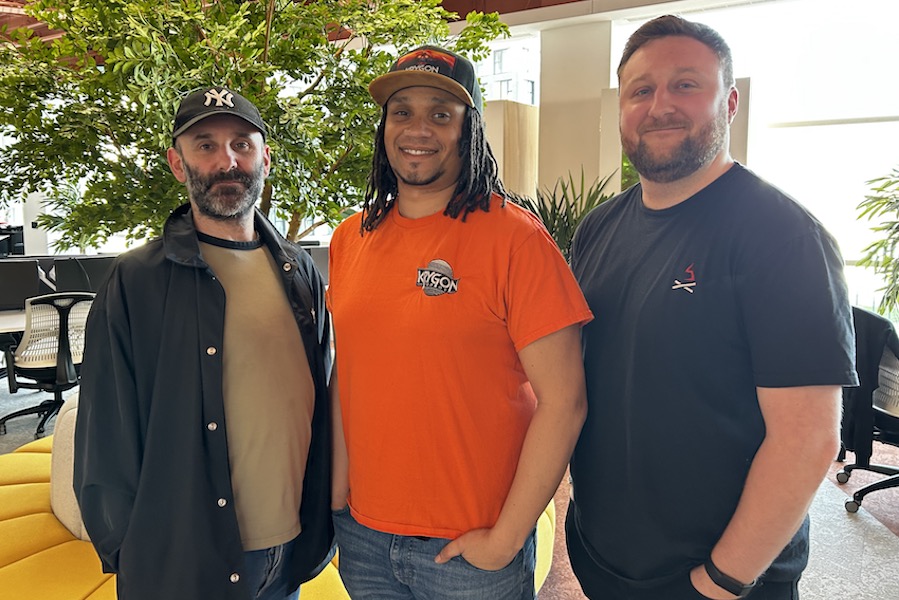The night that changed Liam Gallagher’s life
- Written by Dave Haslam
- Last updated 7 years ago
- Culture, Music

Sitting down to write my new book, and trying to work out what had happened in all my years enjoying and contributing to music in Manchester, there are one or two things I knew were significant at the time.
These include events going back to November 1983 when the Smiths played the Hacienda in front of a packed crowd, but also, more recently, the opening of the New Order shows at MIF last year.
But one event I organised now has far more significance than anyone knew when it happened. I’m talking about a concert by James and the Roses on 30th May 1988 – thirty years ago this week.
A few months earlier I’d phoned Gareth Evans, the Stone Roses manager, as I had a favour to ask him and the band.
Paul Cons and I were involved campaigning against Clause 28 of the Local Government Act 1988 which set limits on the ability of schools to talk openly – let alone positively – about homosexuality. In practical terms, this demonised young gay people and sabotaged the ability of schools to give pastoral care and support to their students.
The campaign against Clause 28 drew much support in the city; 25,000 marchers rallied in Manchester in February of 1988.
Paul and I wanted to do an anti-Clause 28 fundraiser. I asked Gareth if we could use one of the clubs he ran – the International Two (formerly the Carousel) on Plymouth Grove. In addition, I was hoping the Stone Roses would join the bill.
I’d already asked James to headline and they’d agreed. I knew James supported progressive causes, but the Stone Roses had no track record of performing at benefit gigs. They accepted without hesitation. On the night, Ian put down a heckler who questioned why they were onstage for a pro-gay cause like that.
The band weren’t feigning support for the cause. Ian, John and Reni had been among the marchers at the February demo. It had actually taken place on Ian Brown’s birthday.
I set an admission price of just £4 in advance and £5 on the door. All tickets were sold.
I spent far too much time going back and forth between the two dressing rooms. The Roses didn’t want to suffer the usual fate of a support band – to play in front of a less than full house. They hung on and hung on, doing everything they could to delay their set.
Meanwhile, James – singer Tim Booth in particular – were annoyed and wound up by what they considered to be unprofessional behaviour. Eventually, the Roses took to the stage, around an hour later than had been agreed.
After their set, the venue stayed busy and the atmosphere electric. James were a big draw in Manchester in 1988, and, as now, a great live band.
Meanwhile, Ian Brown of the Stone Roses still considers the benefit gig at International Two one of his band’s greatest shows.
The significance doesn’t stop there. Liam and Noel Gallagher both claim that if they hadn’t gone to this gig, Oasis would never have happened. The two brothers attended the gig although, true-to-form, they went separately.
Noel had seen the band before. He was – and remains – a fan, once explaining: “They were our band, I suppose. The Roses sang in Manchester accents, they wore the same clothes, they went to the same clubs, you could see them down the same shops where you were buying your desert boots and your flared jeans.”
Noel struck up a conversation with Graham Lambert of the Inspiral Carpets who was attempting to tape record the show. It was his first encounter with an Inspiral. He went on to work for the band on the road and at their office on New Mount Street. This was his door into the music business.
For Liam – then aged just fifteen – the intensity, and the pleasure of the gig – specifically Ian Brown’s onstage swagger – inspired him to get involved in music. He later claimed: “That was my favourite gig of all time, killed me dead, changed me f**kin’ life. If I hadn’t gone that night, I’d probably be sitting in some pub in Levenshulme.”
Noel again: “Without the Roses there would have not been Oasis, because I don’t think Liam would have bothered joining Bonehead’s group, and subsequently I wouldn’t have bothered joining Liam’s group.”
In 1988, the NME had just taken on a real bright spark – Sarah Champion, a young fanzine editor from Chorlton. In 2012, she reflected on those years and that anti-Clause 28 gig at the International Two in particular, describing the occasion that crystallised the sense of euphoria in the city.
“I think “Madchester” was born that night,” she said.” It’s not just myth, somehow the drugs and music were combining and something big was happening”.
So it’s worth recalling that despite the laddish reputation and following of some of the Manchester bands, Ian Brown spent his birthday marching against homophobia, and that the night that changed Liam’s life was an event supporting that same cause.
In many ways, all this was part of a deeper sea change in the Madchester years: an opening-up of attitudes in the city. People wanted to be involved. It was an inspiring time. And in the venues and clubs people were dancing together, and love was in the air.
Dave Haslam’s Sonic Youth Slept On My Floor: Music, Manchester & More is available online and at all decent bookshops.
- This article was last updated 7 years ago.
- It was first published on 29 May 2018 and is subject to be updated from time to time. Please refresh or return to see the latest version.
Did we miss something? Let us know: press@ilovemanchester.com
Want to be the first to receive all the latest news stories, what’s on and events from the heart of Manchester? Sign up here.
Manchester is a successful city, but many people suffer. I Love Manchester helps raise awareness and funds to help improve the lives and prospects of people across Greater Manchester – and we can’t do it without your help. So please support us with what you can so we can continue to spread the love. Thank you in advance!
An email you’ll love. Subscribe to our newsletter to get the latest news stories delivered direct to your inbox.
Got a story worth sharing?
What’s the story? We are all ears when it comes to positive news and inspiring stories. You can send story ideas to press@ilovemanchester.com
While we can’t guarantee to publish everything, we will always consider any enquiry or idea that promotes:
- Independent new openings
- Human interest
- Not-for-profit organisations
- Community Interest Companies (CiCs) and projects
- Charities and charitable initiatives
- Affordability and offers saving people over 20%
For anything else, don’t hesitate to get in touch with us about advertorials (from £350+VAT) and advertising opportunities: advertise@ilovemanchester.com

£14.5m cultural and creative hub to ‘mark a new chapter’ for Stockport Town Centre

Now you can own a piece of TV history and support a much loved NHS Charity

The welcoming Manchester community where board games build friendships

Best bars and pubs to watch the football and live sport in Manchester

Discotheque Royale vs Piccadilly 21s: which was your favourite 90s Manchester club?
















